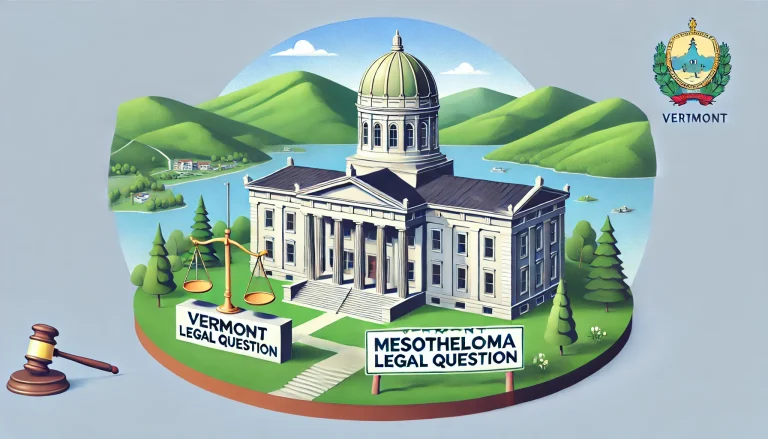Mesothelioma is a devastating cancer caused by exposure to asbestos, a material widely used in industries before its dangers became known. For individuals and families in Vermont affected by mesothelioma, addressing the Vermont mesothelioma legal question is vital. Legal actions can provide financial relief to cover medical bills, lost wages, and emotional suffering. This guide will explain the key aspects of mesothelioma cases in Vermont, helping victims navigate the complex legal process.
Mesothelioma and Asbestos Exposure in Vermont
What is Mesothelioma?
Mesothelioma is a rare cancer that develops in the thin layer of tissue surrounding the lungs (pleura), abdomen (peritoneum), or heart (pericardium). It is caused by inhaling or ingesting asbestos fibers, which become lodged in the body and cause inflammation over time. Symptoms often appear decades after exposure, making it difficult to diagnose early.
Sources of Asbestos Exposure
Vermont has a history of asbestos use in industries like manufacturing, construction, and power generation. Older buildings, pipes, and industrial sites are common sources of asbestos exposure. Workers in these environments were often unaware of the dangers, and protective measures were minimal.
High-Risk Groups
Certain groups are more likely to develop mesothelioma:
- Industrial Workers: Those in construction, manufacturing, and shipbuilding faced direct exposure.
- Military Personnel: Asbestos was commonly used in military ships and installations.
- Families of Workers: Secondary exposure occurred when workers brought asbestos fibers home on clothing or tools.
Legal Framework for Mesothelioma Cases in Vermont
Statute of Limitations
Vermont law sets time limits for filing legal claims:
- Personal Injury Lawsuits: Victims must file within three years of diagnosis.
- Wrongful Death Lawsuits: Families have two years from the victim’s death to file a claim.
It’s crucial to act quickly, as missing these deadlines may forfeit the right to compensation.
Vermont Asbestos Laws
The state enforces strict regulations on the handling and disposal of asbestos to prevent further exposure. Companies must follow federal and state guidelines to protect workers and the public.
Determining Liability
Liability often falls on employers, manufacturers, or property owners who failed to warn workers about asbestos risks or provide proper safety measures. Legal claims can hold these parties accountable for their negligence.
Legal Options for Mesothelioma Victims
Filing a Lawsuit
Victims can pursue two main types of lawsuits:
- Personal Injury Lawsuits: Filed by individuals diagnosed with mesothelioma, seeking compensation for medical expenses, pain, and suffering.
- Wrongful Death Lawsuits: Filed by families after the death of a loved one, aiming to recover damages for financial and emotional losses.
Asbestos Trust Fund Claims
Many companies responsible for asbestos exposure have set up trust funds to compensate victims. These funds allow claims to be resolved more quickly than traditional lawsuits, often without going to court.
Veterans’ Benefits
Military veterans exposed to asbestos during service may qualify for benefits through the U.S. Department of Veterans Affairs (VA). These benefits can help cover medical expenses and provide monthly compensation.
Compensation for Mesothelioma Cases
Types of Compensation
Victims and their relatives may be compensated financially for:
- Medical Expenses: Including treatments, hospital stays, and medications.
- Lost Wages: Restitution for money lost as a result of illness or taking care of others.
- Pain and Suffering: Monetary compensation for physical and mental pain.
- Loss of Companionship: For families who lost a loved one to mesothelioma.
Factors Affecting Compensation
The amount of compensation depends on several factors:
- The severity of the illness and its impact on the victim’s life.
- The costs of medical treatment and ongoing care.
- The degree of negligence by the responsible party.
Choosing the Right Vermont Mesothelioma Lawyer
Importance of a Specialized Lawyer
Mesothelioma cases are complex and require legal professionals experienced in asbestos litigation. A skilled lawyer can:
- Investigate exposure history.
- Identify liable parties.
- Maximize compensation through settlements or court verdicts.
Qualities to Look For
- A proven track record in mesothelioma cases.
- Client testimonials and successful settlements.
- No up-front costs—the majority of mesothelioma attorneys take cases on a contingency fee basis, which means they only get compensated if you prevail.
Steps to Take After a Mesothelioma Diagnosis
- Document Your Diagnosis: Keep records of your medical diagnosis and treatments.
- Identify Exposure Sources: Note where and when you may have been exposed to asbestos.
- Contact an Attorney: Consult with a mesothelioma lawyer as soon as possible.
- File Your Claim: Ensure your lawsuit or claim is filed within the legal time limits.
Challenges and Frequently Asked Questions
Common Challenges
- Identifying the Source of Exposure: Asbestos exposure often occurred decades ago, making it difficult to trace.
- Managing Legal and Health Concerns Simultaneously: Victims must handle legal claims while undergoing treatment.
Conclusion
For those facing Vermont mesothelioma legal questions, taking legal action can be a vital step toward securing financial support to cover medical expenses and provide stability for loved ones. Knowing your rights, acting promptly within Vermont’s legal deadlines, and consulting an experienced mesothelioma attorney are essential steps to achieving justice. If you or someone you love has been affected by mesothelioma, don’t delay—reach out to a qualified legal professional to explore your options and begin the process of seeking fair compensation today.
FAQs About Vermont Mesothelioma Legal Question
Can I sue even if I don’t know exactly where I was exposed to asbestos?
Yes, a skilled lawyer can investigate your work and personal history to identify exposure sources.
Are mesothelioma lawsuits expensive to file?
Most lawyers work on a contingency basis, meaning you pay nothing upfront and only if you win.
Can I file a claim if I was exposed to asbestos decades ago?
Yes, the statute of limitations starts from the time of diagnosis, not the exposure date.
Is compensation from asbestos trust funds taxed?
Compensation for wrongful death or personal injury is typically exempt from taxes.
Can I receive compensation if I live outside Vermont but was exposed there?
Yes, you can file a claim in Vermont if the asbestos exposure occurred in the state.

